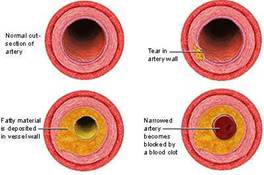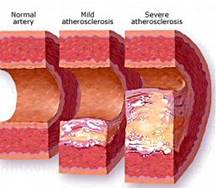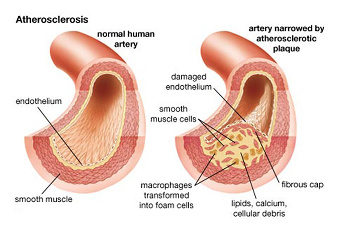ATHEROSCLEROSIS
As we grow older, cholesterol deposits inside the blood vessels in various parts of the body, including the coronary arteries, causing gradual blockage of blood flow. This gradual narrowing is called atherosclerosis.
Men are more likely to have a heart attack than women.
Symptoms
Typically there is pain in the chest with tightness and difficulty in breathing. Sweating, nausea and feeling faint may be other symptoms. The pain may be in the front of the chest or behind the breastbone. From there it may go to the neck or left arm. |
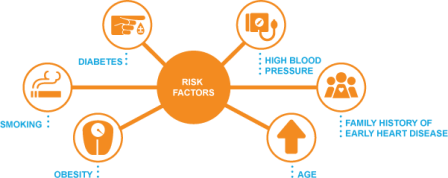
|
The risk factors include:
-
Cigarette smoking
-
Diabetes
-
High blood pressure
-
Overweight
-
High cholesterol, and lower values of HDL v the good cholesterol
-
Lack of physical activity
-
A family history of heart attacks
-
Stress, chronic anger and anxiety
|
Diagnosis
An electrocardiogram, ECG, is taken which is record of the electrical activity of the heart. An ECG gives information about the rate at which the heart is beating, whether there are any abnormal rhythm patterns and also if there are areas of the heart muscle that are damaged due to the heart attack.
An X-Ray of the chest may be done. An echocardiogram is a type of scan that gives useful information on the functioning of the heart. Conclusive evidence of blockage in the coronary vessels is provided by the coronary angiogram.
Treatment
Heart attacks require immediate medical attention and hospitalisation. The first few minutes and hours are critical. In the early stages, medicines can be given to dissolve the clot in the coronary arteries. If the blood pressure is high, drugs are given to lower the pressure. |
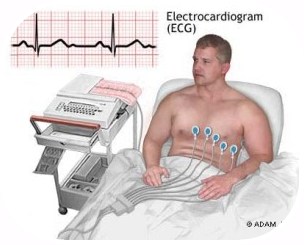 |
 |
Prevention of heart attacks
Those at high risk of developing heart attacks must take the following preventive measures:
-
Their diet must be healthy and low in fats and salt, high in fibre and complex carbohydrates.
-
Weight reduction is necessary for those who are overweight
-
Physical exercise must be done regularly.
-
Smoking must be stopped completely.
Those with diabetes, high blood pressure or high cholesterol must take drugs to keep their condition under control. |
Protection against heart disease
Deficiencies in Vitamins A, C, E and beta carotene have been linked to heart disease. All of these nutrients have antioxidant effects and other properties that may benefit the heart.
-
Vitamin E: Eating foods rich in natural vitamin E may be protective. Vitamin E may prevent blood clots and the formation of fatty plaques and cell proliferation on the walls of the arteries
-
Vitamin C: Vitamin C appears to maintain blood vessel flexibility and to improve circulation in the arteries
-
Folate, Vitamin B6, and Vitamin B12. Several important studies have demonstrated a link between deficiencies in the B vitamins folate, B6, and B12 and elevated blood levels of homocysteine, an amino acid believed to be a risk factor for atherosclerosis. Both B12 and folate reduce homocysteine levels, and evidence is increasing that this effect may protect the heart.
-
Vitamin B3. Niacin (vitamin B3) is used for lowering unhealthy cholesterol levels
-
Carotenoids and heart protection: A high intake of fruits and vegetables containing beta carotene, lycopene, and other carotenoids may reduce the risk of heart attack.
-
Phytochemicals and heart protection: Flavonoids, particularly those found in both black and green tea, onions, red wine or red grape juice, and apples, may protect against damage done by cholesterol and help prevent blood clots
|

